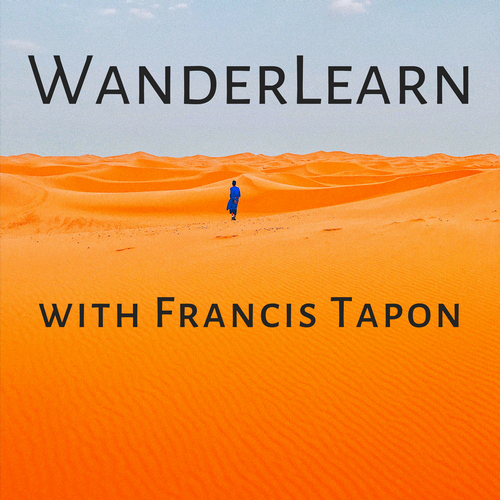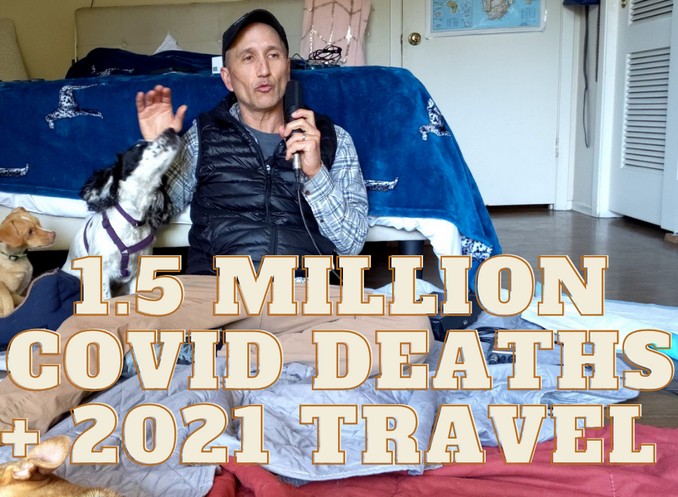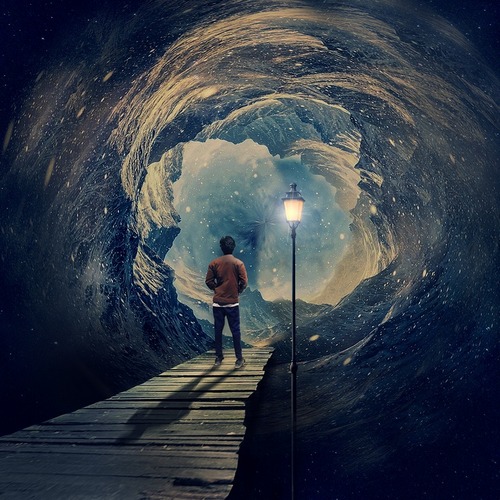WanderLearn Podcast

Check out the latest WanderLearn episodes!
Take a profound and distant journey. Call it:
- Deep Travel
- Immersive Travel
- Slow Travel
- Vagabonding
I will guide you to the intersection of travel, technology, and transformation.
The WanderLearn podcast will compel you to go beyond your comfort zone.
I wander all over the world and I share what I learn with you! In so doing, I hope you'll be inspired to do the same. Travel is the best university.
How to Subscribe to the WanderLearn Podcast
Search for "WanderLearn" in your favorite podcast player.
 If that fails:
If that fails:
This email address is being protected from spambots. You need JavaScript enabled to view it. the details of the podcast player that failed to find the show.- While I fix the problem, copy and paste this feed into your favorite podcast player:
https://wanderlearn.com/feed.xml
Although subscribing is essential, two other things help the WanderLearn podcast:
- Download every WanderLearn episode as I produce them! That's what helps get it noticed! It's better to have 100 subscribers and 100,000 downloads per episode than 10,000 subscribers and 100 downloads.
- Share the episodes! Word of mouth is gold!
Get My Infrequent Newsletter!
Don't just listen, watch!
Some WanderLearn episodes will also be videos, so be sure to subscribe to my YouTube Channel too.
I welcome comments and questions for each episode, which are listed below, from the most recent to the first one. I promise to answer any question from one of my Patrons. That's just one way to get rewarded for supporting the show!
Listen to the latest episodes below!
The show notes and comments for each episode are below

Dec 31, 2021 Update: Look for the blue boxes to see how my predictions did!
Everyone loves to say, "I told you so."
But few are willing to admit, "I told you something wrong."
Even though every human makes mistakes every day, it's surprisingly hard to find humans who regularly say, "I was wrong."
I make annual predictions not to say, "I told you so," but rather to teach myself some humility.
I predict events so I can publicly humiliate myself.
It's my way of telling the world, "Look how spectacularly wrong I was. I am an idiot."
I recommend that everyone write down annual predictions for this reason.
It's a way to keep your ego in check.
Of course, you'll probably get a few things right, but the point is that you get to say those magic words: "I was wrong."
See how I did on my 2020 predictions.
Here are the predictions for 2021

For this Xmas, here's a special present - a podcast like no other!
Sym Blanchard's first podcast with me in #3 in my all-time downloaded podcasts.
My second one with him was also super popular.
To make his third podcast even more interesting, Sym is joined by his girlfriend, Patty Montgomery. Together, they share:
- Why it took them 60 years to finally become a couple.
- How they manage their relationship when Sym is vagabonding.
- How their paths crisscrossed until they finally merged.
- How Sym nearly died on the CDT (jump to the halfway point for that).
- Where they traveled in 2020.
- If Morocco is for you.
- Forrest Fenn's found treasure.
- What they think of the COVID vaccine.

Nick Jankel has written several books, including Spiritual Atheism.
We discuss his book and other topics.
Nick Jankel helps you take the pain out of transformation. He helps you blast through the barriers that block creativity and innovation and unleash conscious changes in leadership and life that bring less suffering and more thriving into the spaces we touch.
Either listen to the podcast or watch it on YouTube.
Sponsors
This show is sponsored by my Patrons
More info
You can post comments, ask questions, and sign up for my newsletter at http://wanderlearn.com.
If you like this podcast, subscribe and share!
On social media, my username is always ftapon. Follow me on:
- http://facebook.com/ftapon
- http://twitter.com/ftapon
- http://youtube.com/user/ftapon
- http://pinterest.com/ftapon
- http://tumblr.com/ftapon
My Patrons sponsored this show!
Claim your monthly reward by becoming a patron at http://Patreon.com/FTapon
Rewards start at just $2/month!
If you prefer to do a one-time contribution, you can send it to my PayPal at
If you prefer giving me Bitcoin, then please send BTC to my tip jar: 3EiSBC2bv2bYtYEXAKTkgqZohjF27DGjnV

On March 27, 2020, we had 60,000 COVID deaths worldwide.
I asked several physicians at my brother's virtual birthday party (on March 27) to predict how many deaths we would suffer in 2020.
They said 100-250k.
Rejoice said 1 million.
I said 1.5 million.
In December 2020, we hit the grim 1.5 million number, which is triple the annual number of worldwide flu deaths.
I also discuss my 2021 travel plans.

Get out of your echo chamber! Have conversations with people you disagree with!
In that spirit, I am once again talking with Derek Loudermilk.
We discuss:
- Lucid dreaming
- Listening to your subconscious/gut
- Channeling
- Aliens
- UFOs
- Harmonic Convergence
- Unified Field Intention Experiment
- Why be a skeptic?
You can watch this episode on YouTube.
If you missed my first episode with Derek, listen or watch it now.
Thanksgiving 2020 will force Yanks to dig deep because it's been a "tough year" for them:
- Racial tensions
- Protests
- COVID-19
- Shutdowns
- Unemployment + suicides
- Wildfires
- Elections
Therefore, I list a bunch of random things that we should be grateful for this year (and every year).
This was unrehearsed. I had no script. I just rattled off things that popped into my head.
- Hal Urban on The Power of Good News
- Who I Am Voting For In The US 2020 Presidential Election
- Czechia vs. The Czech Republic - Name Debate!
- AMA: African Planned Cities, COVID, My Books in Academia
- 7 FAQs About Bitcoin Becoming A Country's Currency
- Circumventing the Globe Without Airplanes - Rambling Ryan
- Creating Digital Virtual Art with Garry Rone
- Random Facts About Everything That Take You Everywhere
- How a Family of 7 Traveled to 7 Continents in 9 months
- Are Hunters An Endangered Species Wonders Hunter of the Year
- NASA Astrophysicist Jack Lissauer On Tides & Terraforming
- What is a Reasonable Number of Unarmed Police Shootings?
- What If Earth Orbited Jupiter? A NASA Astrophysicist Answers
- 100th Episode! Special AMA!
- Reflections on COVID-19's 650,000 Deaths Worldwide
- Hunting Myths - Brittany Longoria Explains
- Peer-to-peer lending with Constant using cryptocurrency
- How Anti-Poaching Is Different Than Counter-Poaching
- Travel By Living Abroad with Traveling Mitch
- Our Future Brains and Countries
- Forrest Fenn's Treasure Found in the Rocky Mountains
- Debating UFOs, Aliens, Crop Circles, and the Supernatural
- Is the Widespread Destruction and Theft Justified? #GeorgeFloyd
- Riots in Minneapolis - Gary Arndt reports from his hometown
- Zen Pilot Is Flying From Pole to Pole
- Why is Bitcoin Worth Anything?
- 80,000 COVID vs. 80,000 Flu Deaths
- 8 Flaws in Bitcoin's Stock-to-Flow Model Will Doom It
- Gold Expert On Bitcoin, Stock-To-Flow, Asteroids, Depression
- Bitcoin vs. Other Cryptocurrencies
- Solving the Coronavirus Crisis
- Don't Hike Your Own Hike in 2020
- Thru-Hike To Escape the Coronapocolypse
- Don't Worry Too Much About COVID-19 and the Coronapocolypse
- Running 30 Marathons Before Turning 30 - Liz Warner
- Overlanding in 35 African countries in 3 years - Dan Grec
- How To Travel When You Have Limited Time
- Answering Kidnapping Podcast Criticisms
- Traveling To Find One's Ancestors
- Being Russian in Estonia
- How To Housesit When You Travel
- Backpacking With Zpacks - Matt Favero Shares The Vision
- How To Take A Sabbatical - DJ Didonna
- Traveling for 30+ Years - Mike Spencer Bown
- How Home Exchanges Work
- Alternatives to the Main El Camino de Santiago - Susan Alcorn
- Life Lessons From A Lion Tracker - Boyd Varty
- How to Avoid or Survive a Kidnapping
- Being A California Mayor: Burlingame's Donna Colson
- Eradicating Malaria in Sumbawa, Indonesia and Beyond
- How To Avoid and Survive an Avalanche
- Touring the World with Jessica Husson
- How Does A Colonial Ghost Haunt Africa's Borders?
- How To Travel Responsibly and Ethically
- Algerians Reveal Their Unseen Sides
- Humans Are Part Of Nature Despite What Environmentalists Say
- The Unseen Egypt with High-End Journeys
- AMA About the Book, Jail, and Languages
- Biking To Over 150 Countries with Patrick Martin Schroeder
- Using Basketball To Connect With Africans
- Biking The Americas From Canada To Patagonia
- Running An Egyptian Luxury Hotel With A Casino Is Tricky
- Debating Environmentalism
- AMA #2 - Bitcoin Q&A
- Unseen Sides of Tanzania
- Hiking to Muxia on El Camino de Santiago
- Traveling To Every Country With 3 Kids
- How Blockchains Will Disrupt Everything - Stephen P. Williams
- The Smartest Guy In Cameroon - Africa's Einstein
- 3 Young Egyptians In Luxor
- Lessons from the Hunting Debate
- Brittany Longoria Explains Her Controversial Leopard Photo
- Are Hunters Responsible for the Decline of Africa's Wildlife?
- How Volara is Bringing Voice Assistants to Hotels
- Gossamer Gear's Founder Glen Van Peski on Backpacking
- Is Libya Still A Shit Show? Frederick Wehrey answers
- A Persian Goes To Africa
- When To Use Vacasa
- Do Africans Still Practice Witchcraft Or Is That A Myth?
- How To Make A Successful Documentary Movie About Mountains
- How To Do Good & Make Money in Africa - The Anou
- How Does Nigeria Compare to Other African Countries?
- Rolf Potts on Vagabonding, Souvenirs, and Getting Drunk at 5
- When Will iinside Give Us Intelligent Airports?
- Whether You Love or Hate Travel Tours, Check Out TourRadar
- A 66-year-old Adventurer Shows How To Live A Meaningful Life
- Vacasa Is A Full-Service Solution If You Have A Second Home
- Acting CEO of Rome2Rio Makes Partnership With Lonely Planet
- 7 Predictions For 2019
- JoAnneh Nagler Explains How To Make Money Being An Artist
- Tim Butcher - Author of Two Books on Africa
- AMA: Repairing the Schism Between Locals and Tourists
- How To Create A Top Travel Podcast
- The Winding Tree Foundation Founders Answer Criticism
- How To Use, Not Abuse, Couchsurfing
- Amtrak Travel Tips for 2019
- What To Do If You Can't Afford to Travel
- How To Become an A-list Travel Blogger - Gary Arndt Explains
- You're Wrong If You Think You Don't Have Time to Exercise
- Why You Should Always Read Your Alumni Obituaries
Your comment will be deleted if:
- It doesn't add value. (So don't just say, "Nice post!")
- You use a fake name, like "Cheap Hotels."
- You embed a self-serving link in your comment.




